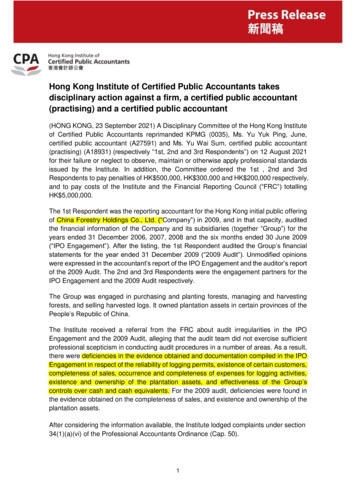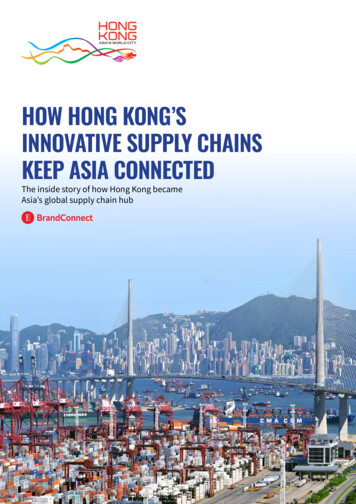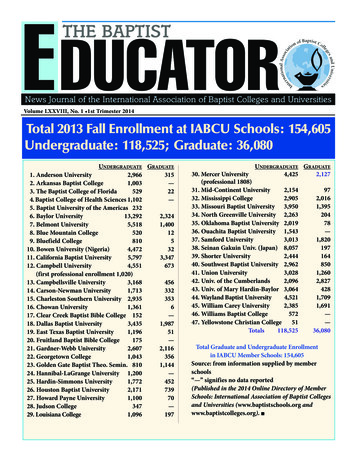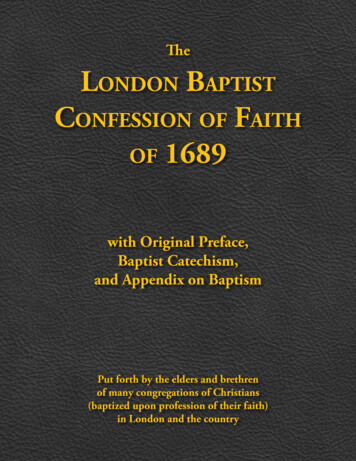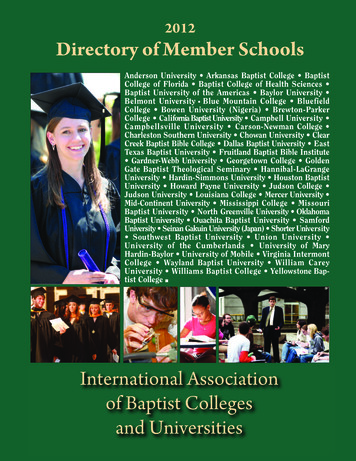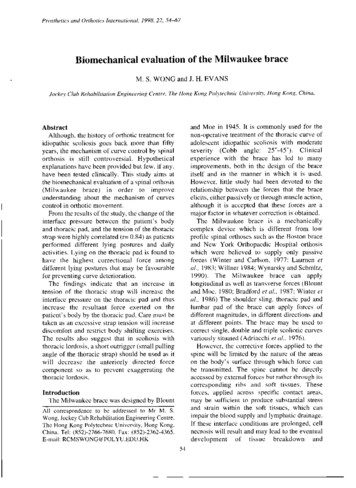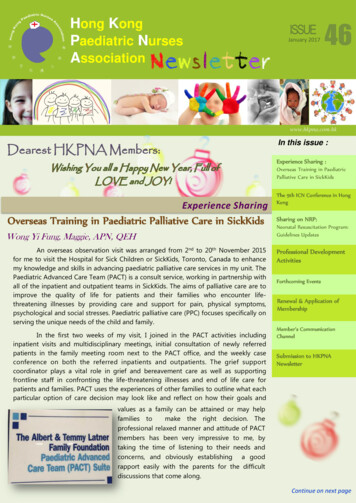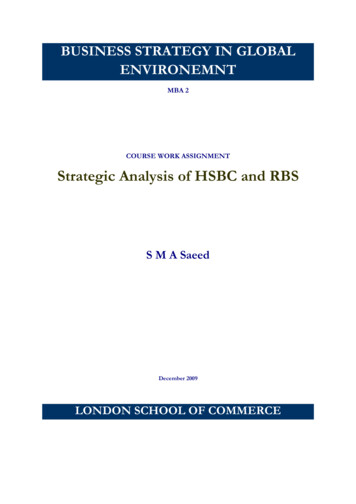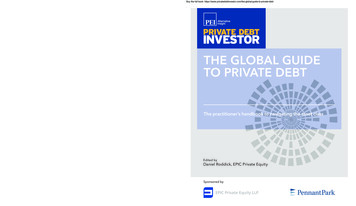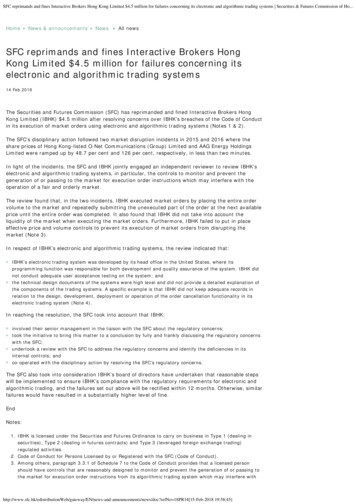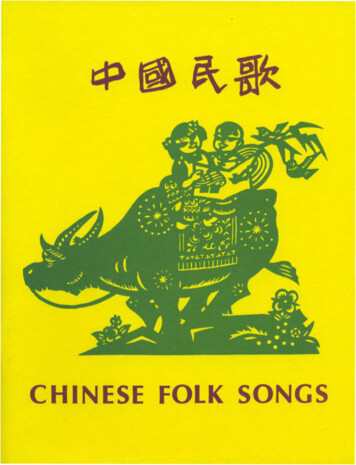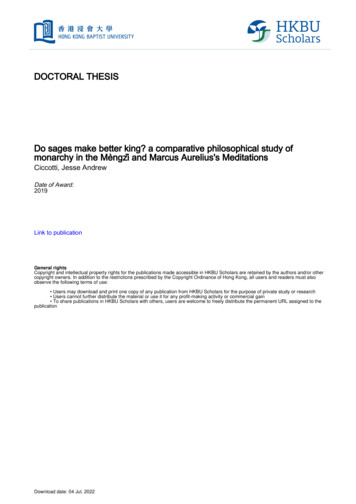
Transcription
Hong Kong Baptist UniversityDOCTORAL THESISDo sages make better king? a comparative philosophical study ofmonarchy in the Mèngzǐ and Marcus Aurelius's MeditationsCiccotti, Jesse AndrewDate of Award:2019Link to publicationGeneral rightsCopyright and intellectual property rights for the publications made accessible in HKBU Scholars are retained by the authors and/or othercopyright owners. In addition to the restrictions prescribed by the Copyright Ordinance of Hong Kong, all users and readers must alsoobserve the following terms of use: Users may download and print one copy of any publication from HKBU Scholars for the purpose of private study or research Users cannot further distribute the material or use it for any profit-making activity or commercial gain To share publications in HKBU Scholars with others, users are welcome to freely distribute the permanent URL assigned to thepublicationDownload date: 04 Jul, 2022
HONG KONG BAPTIST UNIVERSITYDoctor of PhilosophyTHESIS ACCEPTANCEDATE: February 22, 2019STUDENT'S NAME: CICCOTTI Jesse AndrewTHESIS TITLE:Do Sages Make Better Kings? A Comparative Philosophical Study of Monarchy inthe Mèngzǐ and Marcus Aurelius’s MeditationsThis is to certify that the above student's thesis has been examined by the following panelmembers and has received full approval for acceptance in partial fulfillment of the requirements for thedegree of Doctor of Philosophy.Chairman:Prof Hjort MetteDean, Faculty of Arts, HKBUInternal Members:Prof Kwan Kai ManProfessor, Department of Religion and Philosophy, HKBU(Designated by Head of Department of Religion and Philosophy)Dr Boone Mark JeremiahAssistant Professor, Department of Religion and Philosophy, HKBUExternal Members:Dr Wong Man HoAssociate ProfessorDivision of HumanitiesThe Hong Kong University of Science and TechnologyDr Tang Siu FuAssociate ProfessorSchool of ChineseThe University of Hong KongIn-attendance:Dr Ng William Y NAssociate Professor, Department of Religion and Philosophy, HKBUIssued by Graduate School, HKBU
Do Sages Make Better Kings?A Comparative Philosophical Study of Monarchyin the Mèngzǐ and Marcus Aurelius’s MeditationsCICCOTTI Jesse AndrewA thesis submitted in partial fulfillment of the requirementsfor the degree ofDoctor of PhilosophyPrinciple Supervisor:Dr. William Ng (Hong Kong Baptist University)February 2019
DECLARATIONI hereby declare that this thesis represents my own work which has beendone after registration for the degree of PhD at Hong Kong Baptist University, andhas not been previously included in a thesis or dissertation submitted to this or anyother institution for a degree, diploma or other qualifications.I have read the University’s current research ethics guidelines, and acceptresponsibility for the conduct of the procedures in accordance with theUniversity’s Research Ethics Committee (REC). I have attempted to identify allthe risks related to this research that may arise in conducting this research,obtained the relevant ethical and/or safety approval (where applicable), andacknowledged my obligations and the rights of the participants.Signature:Date:i
AbstractThis project examines and compares the political philosophies supportingthe centralized authority of monarchs elaborated by two major figures of antiquity,Mèngzǐ (孟子 Mencius, 372-289 BC) of the Warring States period in China, andMarcus Aurelius Antoninus (Μαρκος Αυρηλιος Αντωνινος, 121-180 AD) of thelater Roman Empire. The texts that have transmitted the ideas of these twomen—the Mèngzǐ and the Meditations—have shaped the political actions of rulers,as well as the ideas and ideals of political theorists, from their formation down tothe present day. Each thinker made substantial claims concerning the role of aphilosophically-oriented monarch in actualizing governance that is bothbenevolent and beneficent under a form of absolute authority. The present studywill compare basic principles of Mèngzǐ’s and Marcus’s political philosophies asthey relate to monarchical rule expressed in those two classic works, and drawfrom these principles to create a new criterion in political philosophy that can beused to critique contemporary political arrangements characterized by strongcentralization of power. This project will not be a polemic for monarchy orstrongly centralized political governments; it is an exploration into politicalphilosophical principles advocated by Marcus and Mèngzǐ, demonstrating howrulers in strongly centralized political institutions can exercise their power in waysthat result in good for the people, and how principles advocated by Marcus andMèngzǐ can be transformed into a criterion for practical application incontemporary political settings, without having to resort to political philosophicalprinciples popular in most Anglo-European contexts.ii
AcknowledgmentsI have come to love reading the acknowledgments page in anything I read,any book or dissertation or project. It is a record of a particular community ofpeople working together to raise someone up, entrusting them with the future ofhuman society, empowering them to steer the ship of human civilization towardsthe sunrise.In terms of academic life, no one has had more influence on me thanProfessor Lauren Pfister, and his wife Mirasy. He was there at the beginning as Ibegan to explore what it meant to be a scholar, encouraging, coaxing, pressing meto be more precise, always raising the bar of excellence a notch higher andrejoicing together when I had cleared the next level. While the years of work hepoured into me is, unfortunately, not recognized on the title page of this work, heserved as my informal adviser for six years before formalizing the relationshipwhen I entered the PhD program as his student for another two years. He retiredafter my second year in the PhD program, and so receives no recognition for thetireless hours of personal and professional time that he sacrificed, and whichcarried me a great deal of the way to where I am today. In addition, even afterretirement he offered to read and offer comments and critique on the whole of thisdissertation, improving it substantially. Any shortcomings that remain cannot beattributed to anyone but myself.I am grateful to Professor Ellen Zhang for serving as my second adviser,for her helpful comments and timely support.I am also grateful to Dr. William Ng, who graciously took over as adviserfor my third and final year as a PhD student. I am grateful for his sacrifice of timeand energy, and kind advice.I am grateful to the small PhD crew in the Religion and PhilosophyDepartment at Hong Kong Baptist University, in particular for Jonathan Johnson’sbrotherhood—maybe now that we’re both finishing up our dissertations we’ll getaround to writing those projects we’ve been discussing for so long now.My doctoral studies would not have been possible without the generousfellowship provided by the Research Grants Council of Hong Kong, through theHong Kong PhD Fellowship Scheme.I am grateful for the influence of a number of close Chinese friends whohave contributed to my academic journey in significant ways. If Wáng Aìjú 王愛菊 Christine had not suggested that I study Chinese philosophy with ProfessorGuō Qíyǒng 郭齊勇 at Wuhan University in the first place, I have no idea whereI would be today. And for Professor Guō’s graciousness and kindness, knowledgeof Chinese philosophy, displaying wisdom enfleshed, and for embracing me as hisstudent-son and my family as his own—it is a love-debt I cannot hope to repay. ToLiú Lèhéng 劉樂恒, Zhèng Zémián 鄭澤棉, and my other friends at WuhanUniversity, I have learned so much from them on how to be a friend.I am grateful to several other scholars far advanced in their careers, andwho have offered their shoulders to stand on, so that I might climb higher.Professor Carine Defoort of KU Leuven, for her endless patience with a projectthat seemed to have no end, and for our many serendipitous meetings andenjoyable chats. Professor Robert Neville of Boston University sat with me forbreakfast in Buffalo, New York at the 2013 ISCP conference, and then welcomedme as a visiting scholar in the fall of 2017 and kindly read the first two chapters ofthis project. Karyn Lai at UNSW and Rick Benitez at Sydney University whoiii
repeatedly extended heartfelt invitations. All of these scholars embraced me as anequal scholar and contributed to my advancement.I also want to thank Denny Wilson, who sent a youthful middle schoolerhome to find the answer to a simple question one Sunday morning. “What was itthat made King Solomon so special?” The answer, of course, is wisdom. AndGwendolyn Sterk, in whose guided study course the seed for this dissertation wasplanted while I was an undergraduate student in the Spring semester of 2002.To family and friends around the world who have supported my family andI in countless ways on this incredible journey, I am forever grateful.A very special thank you goes to my parents, Art and Paula, and to myparents-in-law, Buz and Annick Hughes. Your love and support has taught me agreat deal about how to be a parent and a spouse, and a mature human being.To my boyzz, Zeke and Zach. I would not have made it through thiswithout our wrestling, laughter, random interruptions, and the immense amount ofsupport you gave me by writing your own “dissertations.”To Emily, my bride. I have been a student essentially from the day that wewere joined together, more than nine years ago. Your love and respect means theworld to me. Your sacrifice and support is boundless. As I complete thismonumental project of nine years, this leg of our journey together comes to an end.You may take off your “PhD widow’s” garment. Your husband has returned fromthe land of the doctoral dead. Let us continue to chase Life together!To my God, in whom I live, and move, and have my being. May this bringa smile to your face.DedicationI dedicate this dissertation to my life partner, Emily, who believed in me from thevery beginning of this journey nine years ago. The completion of this dissertationmarks the end of one journey and the beginning of another.iv
Table of ContentsDECLARATION . iAbstract . iiAcknowledgments .iiiTable of Contents . vList of Figures . ixCHAPTER 1: PRELUDE TO A CROSS-CULTURAL, POLITICALPHILOSOPHICAL COMPARISON . 11.1 The Project and Its Significance . 11.1.1 The Project . 11.1.2 Significance of this Project . 21.1.2.1 Contemporary Significance and Impact of the Meditations . 81.1.2.2 Contemporary Relevance of the Mèngzǐ . 101.1.2.3 The Need to Correct a Bias in Contemporary PoliticalPhilosophy . 121.1.3 Outstanding Contributions of This Project . 171.2 State of the Research . 181.2.1 Literature Review of Comparative Philosophy and Chinese-StoicPhilosophical Comparisons . 191.2.2 Literature Review of the Mèngzǐ. 271.2.3 Literature Review of the Meditations . 361.3 Structure of the Study. 41CHAPTER 2: HISTORICAL CONTEXTS AND METHODOLOGY OF THISCOMPARATIVE POLITICAL PHILOSOPHICAL PROJECT . 472.1 Historical Contexts and Considerations . 472.1.1 Warring States China . 472.1.2 Late Roman Empire . 512.2 Methodological Considerations . 562.2.1 Philosophy in Comparative Mode. 602.2.1.1 The Intuitive Ontology of Philosophical Comparison . 602.2.1.2 The Intuitive Ontology Approach in this Project . 772.2.2 Reading the Meditations with Political Philosophical Insight . 802.2.2.1 Four Critical Views . 822.2.2.1a View 1: Gretchen Reydams-Schils. 82v
2.2.2.1b View 2: Lukas de Blois . 832.2.2.1c View 3: Christopher Gill . 852.2.2.1d View 4: Pierre Hadot. 862.2.2.2 Three Recognizable Forms of Political PhilosophicalExpression in the Mèngzǐ . 882.2.2.2a The Dialectical . 882.2.2.2b The Monologue . 892.2.2.2c The Ambiguous . 902.2.2.3 Reading the Meditations with New Lenses. 912.2.2.3a Marcus the Man. 922.2.2.3b Marcus the Adviser and Marcus the Emperor. 922.2.2.3c Conclusion to Section 2.2.2.3. 94CHAPTER 3: CORE POLITICAL PHILOSOPHICAL ELEMENTS IN THEMÈNGZǏ . 953.1 The Ruler’s Affective Sense of Care (rén 仁) . 993.1.1 Parallels with Feminist Care Ethics . 1053.2 Protecting the Interests (hù 護) . 1123.2.1 Key Principles for Protecting the Interests of the People . 1173.2.1.0 Heaven’s Oversight of Political Affairs . 1173.2.1.1 Material and Moral Enrichment . 1203.2.1.2 Military Protection . 1243.2.1.3 Why Not Mínběn 民本? . 1343.2.2 Mèngzǐ’s Programmatic Suggestions. 1383.3 The People (mín 民) . 1513.3.1 The Question of Tiānxià 天下. 1573.4 Governance, not Government (zhèng 政) . 1663.4.1 The Way of the True King (wáng dào 王道) . 170CHAPTER 4: CORE POLITICAL PHILOSOPHICAL PRINCIPLES IN THEMEDITATIONS . 1744.1 The Primary Principle: Cosmopolis (κοσμóπολις). 1764.1.1 Four Key Features of Cosmopolis . 1784.1.2 Four Key Features of Cosmopolis in the Meditations. 1834.1.2.1 Members of the Cosmic Community . 183vi
4.1.2.2 The Role of Law of the Cosmic Community . 1884.1.2.3 Mode of the Cosmic Community . 1924.1.2.4 The Whole-Part Relationship of the Cosmic Community . 1964.2 A Rational Sense of Affection for Fellow Citizens . 2004.2.1 Pathē πάθη and Eupatheiai εὐπαθειαι . 2014.2.1.1 Passions (Pathē πάθη) . 2024.2.1.2 Emotions (Eupatheiai εὐπαθειαι). 2064.2.2 Oikeiōsis (οἰκείωσις) . 2114.2.3 Marcus, a Ruler of Rational Affection for Fellow Civic Members 2154.3 The Common Benefit and Good . 2174.3.1 Passive Good . 2194.3.2 Active Good . 2254.3.3 The “Common” Good . 2294.4 Justice . 2364.4.1 The Role of Justice in Marcus’s Political Philosophy . 2374.4.2 Marcus’s View of Justice . 243CHAPTER 5: A COMPARISON OF MARCUS’S AND MÈNGZǏ’S COREPOLITICAL PHILOSOPHICAL PRINCIPLES . 2545.1 Comparisons, Concepts, and Intuitions. 2545.2 Four Points of Contact . 2575.2.1 The Concept of Polity: Cosmopolis (κοσμόπολις) and Tiānxià (天下). 2575.2.2 A Monarchical Ruler’s Affective Experience . 2605.2.3 The Purpose of the Polity: Protecting the People’s Interests and theCommon Good . 2655.2.4 The Delimitations of “The People” . 2695.3 Three Points of Significant Non-Convergence . 2725.3.1 Justice . 2735.3.2 Governance . 2765.3.3 Varying Concepts of “Law”: “law” (nomos νόμος) and “models” (fǎ法) . 2795.4 A New Criterion in Political Philosophy Pertaining to Strongly CentralizedPolitical Systems . 282vii
5.4.1 Salient Considerations from Marcus’s and Mèngzǐ’s Core PoliticalPhilosophical Principles Relevant to Creating a New Criterion inPolitical Philosophy . 2865.4.1.1 The Scope of the Polity . 2875.4.1.2 What is Good (for the People) . 2915.4.1.3 Reengaging Tronto on Care in Political Ethics . 2935.4.1.4 What is the Link Between Care and Action? Tuī and oikeiōsisRevisited. 2985.4.2 Benevolent and Beneficent Governance . 3025.4.2.1 The New Criterion Defined and Explained. 3035.4.2.2 Questions Not Resolved by this Criterion. 309CHAPTER 6: SUMMARY AND CONCLUSIONS . 3176.1 Concluding Summary. 3176.2 Final Comparison and Closing Comments . 3246.2.1 Mèngzǐ in Marcus’s Court . 3256.2.2 Ancient Monarchical Political Philosophy for Today. 3276.2.3 Do Sages Make Better Kings? . 330Chinese - English Glossary . 333Greek - English Glossary . 334Appendix 1: The Mèngzǐ 1A:7 . 335Appendix 2: The Meaning and Use of Shù 術 in the Mèngzǐ 1A:7 . 342On Van Norden’s (2008) translation of shù, and Zhū Xī’s commentary . 347Appendix 3: koinē phusis κοινὴ φύσις . 351Bibliography. 354Curriculum Vitae. 383viii
List of FiguresFigure 1: Democracy Index Country Grades . 15Figure 2: Passions . 204Figure 3: Emotions . 207ix
CHAPTER 1: PRELUDE TO A CROSS-CULTURAL, POLITICALPHILOSOPHICAL COMPARISON1.1 The Project and Its Significance1.1.1 The ProjectThis project examines and compares the political philosophies supportingthe centralized authority and power of monarchs elaborated by two major figuresof antiquity, Mèngzǐ (孟子 Mencius, 372-289 BC) of the Warring States period inChina, and Marcus Aurelius Antoninus (Μαρκος Αυρηλιος Αντωνινος, 121-180AD) of the later Roman Empire. The texts that have transmitted the ideas of thesetwo men—the Mèngzǐ and the Meditations—have shaped the political actions ofrulers, as well as the ideas and ideals of political theorists, from their formationdown to the present day. Each thinker made substantial claims concerning the roleof a philosophically-oriented monarch1 in actualizing governance that is bothbenevolent and beneficent under a form of absolute authority. The present studywill compare basic principles of Mèngzǐ’s and Marcus’s political philosophies asthey relate to monarchical rule expressed in those two classic works. This projectwill not be a polemic for monarchy or strongly centralized political forms. It is anexploration into principles advocated by Marcus and Mèngzǐ that demonstratehow rulers in strongly centralized political institutions can exercise their power inways that result in good for the people.1In the Rú tradition this person is usually referred to as a “sage-king” shèngwáng聖王, a term that appears only once in the Mèngzǐ (3B:9), but occurs in morefrequency in other Warring States period literature, such as the Lǐjì 禮記 and theXúnzǐ 荀子, as well as the Mòzǐ 墨子. In Mediterranean traditions this person isusually referred to as a “philosopher-king,” first proposed by Plato (see theRepublic 473d, Griffith 2003, 175).1
The double entendre in the title of this dissertation is intended to beprovocative and suggestive. One way of reading it questions whether sagely 2advisers, as in Mèngzǐ’s case, can make a difference in monarchical contexts. Cana sage move the mountain of monarchy with his wisdom? Or is the situation morelike the Chinese idiom (chéngyǔ 成語) indicating the impossibility of the task: 螳臂擋車 (táng bì dǎng chē) “a praying mantis trying to stop a chariot.”3 Readanother way, the title is asking whether a sage such as Marcus, serving in thecapacity and role as king (or emperor), really makes a good king. This leads to anumber of very basic philosophical questions about governance. Is it better orpreferable to be ruled by a sage-king? Or do the promises of technical politicalstructures guarantee political success? Does wisdom really help in ruling? Dosages make better kings?1.1.2 Significance of this ProjectA remarkable feature shared by many ancient Chinese and ancientMediterranean philosophical traditions 4 is a strong preference for monarchicalforms of government led by virtuous and wise monarchs. Mèngzǐ longed for avirtuous and wise person to rise in the feudal ranks and attain not just a2Here and below in reference to Marcus I am using the term “sage” loosely,without intending the richness and lofty demands normally thought of.3The idiom is particularly apt, in that the ancient fable associated with the idiomin the Zhuāngzǐ 莊子 is of a mantis who thinks he is so powerful he tries to stopthe king’s chariot. See Herzberg and Herzberg 2012, 93.4Typically Mediterranean traditions are called “Ancient Philosophy,” but thiscognomen is geographically biased towards what arose initially in Greek contexts,and occasionally inclusive of Roman contexts. I have yet to encounter a situationin which “Ancient Philosophy” truly took into account ALL ancient philosophies.What is usually meant is Mediterranean (those of Greece and Rome, in particular),and so I have sought greater precision with the new term Mediterraneanphilosophy. In fact, under this rubric Islamic philosophical traditions should alsobe included.2
governorship (gōng 公) over a limited territory, but that this sagely person, by thevery virtue and wisdom that makes him desirable as a leader, would become aTrue King (wáng 王) 5 and bring order to all the vassal states, and peace to allhuman societies as distant as the Four Seas. Mèngzǐ comments that such a persononly emerges once every 500 years, according to cosmological recurrences, andshould have appeared 200 years before his time. As a consequence, he lamentswithout hope that one will appear in his lifetime. 6Moving forward 500 years from the time that Mèngzǐ was about 30 yearsold, we observe the inauguration of the reign of a peculiar person in a differentpart of the world. Raised in an aristocratic family with old imperial ties, a lover ofphilosophy from his youth, Marcus Aurelius Antoninus ascended the Romanimperial throne in 161 AD. His indifference to the power accorded to him asemperor is praised by both ancient and modern historians. 7 His reputation forbeing a true philosopher-emperor is so well-known that his desire to not be knownas one who has been “turned into a Caesar” (mē ‘apokaisarōthēs μὴ‘ἀποκαισαρωθῇς’) and is “stained with the purple”8 (mē baphēs μὴ βαφῂς) must5That is, he would be regal not just in title and authority, but that he wouldembody in himself and in his rule the virtue that is expected of such a ruler. Therendering of wáng 王 as “True King” in certain contexts is not a direct translation,but an interpretive decision made by many English translators to indicate thespecial nature of a particular kind of ruler, with variations in form. Some render itKing (Van Norden 2008), true King (Lau 2003), or, as I have adopted it here, TrueKing. Each of these renderings is intended to reflect the ideal, virtuous ruler. Alowercase king (or lacking “true”) usually indicates a person who has usurped thetitle wáng for himself.6See the Mèngzǐ 2B:13.7For two ancient testimonies, see Magie 1921, 133-206, and Cary and Foster1927, 63. For modern praise, see Pollock 1879 and Noyen 1955. For a dissentingvoice, see Stanton 1969.8The Meditations 6.30.3
surely be counted a success. Plato’s dream9 that a person fully committed tophilosophy would have ultimate and unhindered authority and power had beenrealized in the rule of Marcus Aurelius. Marcus put into practice a form ofphilosophy that was not merely a private intellectual exercise, but one rooted in aform of political praxis that informed both the principles and the details of hisreign. 10 Precisely in this sense, then, Marcus is a nearly unprecedented test case inthe history of political philosophy.Furthermore, one of the few complete extant manuscripts recording the“spiritual exercises” 11 of a committed Stoic is Marcus’s volume redactively titled“notes to himself,” most well-known as the Meditations in English 12 and Chénsīlù沉思錄 in Chinese. 13 What is quite anomalous is the fact that Marcus, hisMeditations, and his reign have been studied from a number of angles, usuallyhistorical (Hadot’s work is a rare philosophical study 14), but neither Marcus nor9Plato, The Republic, 473d. See Griffith 2003, 175.Dean Hammer (2008) has attempted a political reading of Cicero’s TusculanDisputations, suggesting that the Tusculan Disputations, though not normally readwith political philosophical insight, can be read politically. My method differsconsiderably from Hammer’s (see section 1.4.2 for an extended explanation), butthe creativity in reading for political philosophical insight a text that is not knownas a “political” text is similar.11I borrow this term from Pierre Hadot, a historian of ancient philosophy whospent much of his career studying and writing on the Meditations. See Hadot 1998.Hadot defines “spiritual exercises” as “practices which could be physical, as indietary regimes, or discursive, as in dialogue and meditation, or intuitive, as incontemplation, but which were all intended to effect a modification and atransformation in the subject who practiced them.” Hadot 2002, 6. For more onHadot’s view of spiritual exercises, see Hadot 1995.12This title was first given to the text by Meric Casaubon, the first time for theMeditations to appear in English, published in 1634. The name stuck, and hasbeen the most common title given
the Mèngzǐ and Marcus Aurelius's Meditations This is to certify that the above student's thesis has been examined by the following panel members and has received full approval for acceptance in partial fulfillment of the requirements for the . Marcus Aurelius Antoninus (Μαρκος Αυρηλιος Αντωνινος, 121-180 AD) of the .
